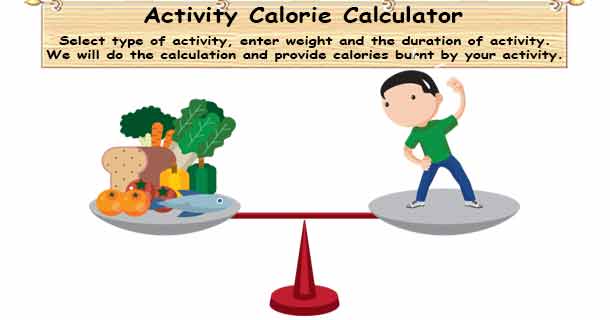The calorie calculator estimates how many calories you burn during your physical activity, exercise, or workout. This does not include the calories you burn during rest and other bodily movements for this please check the basal metabolic rate (BMR) calculator.
How accurate are these calculators?
The activity energy calculator uses the Metabolic Equivalent (MET), which is the energy cost of that specific physical activity. However, please note that these calculators only provide an estimate of the number of calories burned or required and that should not be taken as an exact measurement.
What is the formula to calculate activity calorie calculator?
This calculator estimates calories burned using the following equation.
Calories burned = (Time (duration of activity) × MET × Body Weight) / 200
The duration of activity is in minutes and body weight is in kilograms.
A person who is larger due to more muscle, fat, or height burns more calories than a smaller person. This is also applicable during exercise because the body has to do more work to provide energy to a larger person than to a smaller person. Thus, a person who weighs 120 kg will burn more calories than a person with a smaller weight.
Duration of exercise and its intensity are other factors that affect calories burned. For example, a person who walks 4 km in 1 hour will burn significantly fewer calories than someone who walks 5 km in 30 minutes.
What is MET?
MET stands for the metabolic equivalent of a task. The MET is the ratio of the rate at which a person spends energy (relative to their body mass) while performing a given physical task compared to a reference (average person sitting quietly). By convention, 1 MET is roughly equivalent to expending 1 Calorie per kilogram of body weight per hour.
Exercises are categorized into light intensity, moderate intensity, or vigorous intensity exercises. For example, walking slowly is a light-intensity exercise with a 2.0 MET; playing doubles in tennis is a moderate-intensity exercise with a 5.0 MET; jumping rope at a rate of 100 jumps per minute is a vigorous-intensity exercise with an 11.0 MET.
The total daily calorie calculator provides information regarding the number of calories a person should consume each day for weight maintenance, weight loss, or weight gain. Generally, the number of calories consumed, fewer calories burned through activities, and basal metabolic rate (BMR) will determine whether a person maintains, loses, or gains weight. Theoretically, if the resultant number is 0, the person will maintain their weight; if the number is negative, they will lose weight; if the number is positive, then they will gain weight. For more information about basal metabolic rate, refer to our BMR calculator.
Activity Calorie Calculator
Let's calculate the calories burnt for 18 different activities. Simply, you need to select your type of activity, enter your weight and the duration of your activity. We will do the calculation and provide calories burnt by your activity.
Based on your daily activities your calorie number varies. For example, lighter exercise helps to burn fewer calories than heavier exercise. Similarly, if you are spending most of your time doing nothing, except reading, sitting, and sleeping, then your calorie requirement is much lower.
If you're planning to lose weight, then it is important for you to know the approximate number of calories you are burnt by your daily activities. In addition, you should know that exercise raises your basal metabolic rate, increases the number of calories you burn even during rest, and helps you lose weight faster.
How to use this activity calorie calculator? Enter your weight, physical activity, and duration of exercise, then click the calculate button. This calculator estimates the number of calories you burnt during physical activity.
Use the following calculators to estimate the number of calories burned during certain activities based on the activity and its duration.
How can I improve my calorie burn rate?
There are many ways to improve your calorie burn rate. Here are some tips:
- Increase in physical activity – this can be done by walking more, taking the stairs instead of the elevator, doing household work, or doing other forms of exercise.
- Build muscle mass - Muscle burns more calories, thus increased muscle mass can help burn more calories even when at rest.
- Eat a healthy diet - Eating a diet rich in protein and fiber can provide fullness and satisfaction, which can help you eat fewer calories.
- Get enough sleep – sleep deprivation can lead to weight gain and a slower metabolism.

